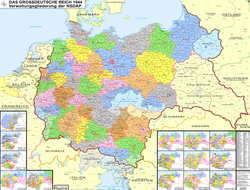Gau Westphalia-North
| Gau Westphalia-North | ||||||
| Gau of Nazi Germany | ||||||
|
||||||
|
||||||
|
Map of Nazi Germany showing its administrative subdivisions (Gaue and Reichsgaue). |
||||||
| Capital | Münster | |||||
| Gauleiter | ||||||
| • | 1931–1945 | Alfred Meyer | ||||
| History | ||||||
| • | Establishment | 12 March 1933 | ||||
| • | Disestablishment | 8 May 1945 | ||||
The Gau Westphalia-North (German: Gau Westfalen-Nord) was an administrative division of Nazi Germany encompassing the Free State of Lippe, Free State of Schaumburg-Lippe and the northern half of the Prussian province of Westphalia between 1933 and 1945. From 1926 to 1933, it was the regional subdivision of the Nazi Party for these areas.
The Nazi Gau (plural Gaue) system was originally established in a party conference on 22 May 1926, in order to improve administration of the party structure. From 1933 onward, after the Nazi seizure of power, the Gaue increasingly replaced the German states as administrative subdivisions in Germany.
At the head of each Gau stood a Gauleiter, a position which became increasingly more powerful, especially after the outbreak of the Second World War, with little interference from above. Local Gauleiter often held government positions as well as party ones and were in charge of, among other things, propaganda and surveillance and, from September 1944 onward, the Volkssturm and the defense of the Gau.
The position of Gauleiter in Westphalia-North was held by Alfred Meyer for the duration of the existence of the Gau.
Coordinates: 51°57′43″N 7°38′08″E / 51.96194°N 7.63556°E
...
Wikipedia



